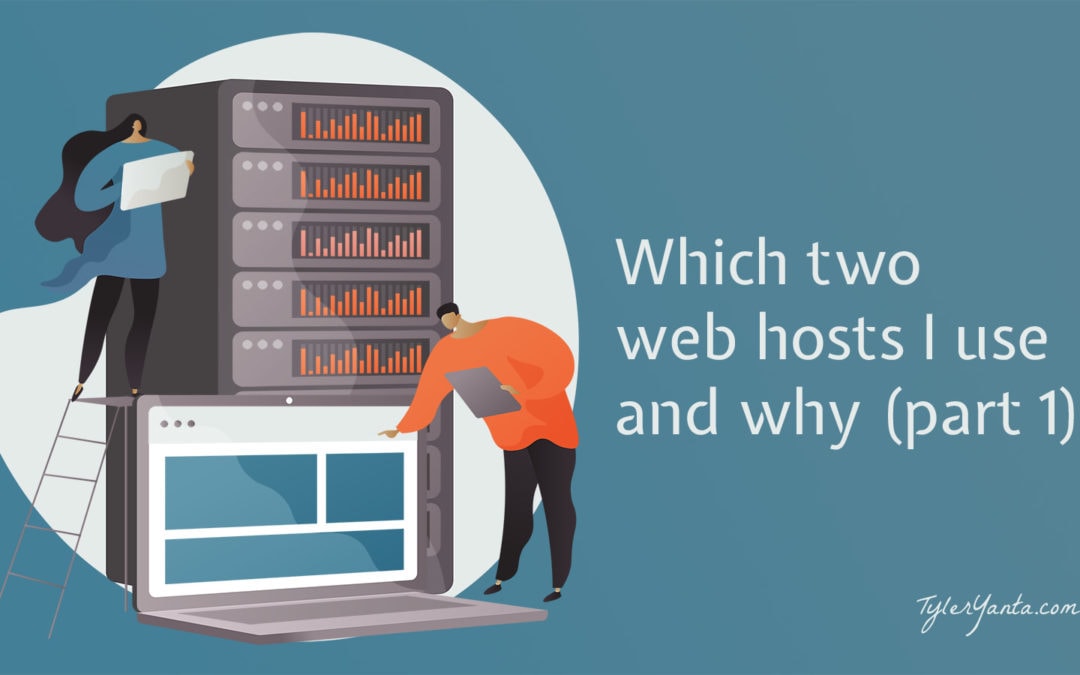Web hosts are (nearly) as infinite as the stars, with some shining decidedly brighter than others, yet the sheer number of options might leave you feeling a little lost in the dark.
Web Host Features I Looked For
When I was shopping around for a new host, here were the things that appealed to me:
(My choice back then is one I've stuck with to this day, and can still whole-heartedly recommend!)
Must-haves:
- 24/7/365 support – This spoke to me then and gives me peace of mind now. I have to say, it's only gotten better with time.
- No limits on specific plugins or apps you may want to run. – Some companies forbid you from using certain configurations so they don't have to support them.
- Performance focus with built-in CDN, auto-healing servers and an optimized stack
- Separate staging environment – The last thing you want is your staging site sharing the same database as your live site, yet you do want it living in a near-identical environment.
- Cost-effective automated offsite backups – Should the inconceivable happen, you want your backups automatically stored safely in another location.
- Seamless scaling without affecting customizations
- Dedicated environment – no sharing resources with other sites
- Transparent, no-surprises pricing – know what you're getting into up front and forecast your growth costs
Nice-to-haves:
- Free migration
- Choice of 5 cloud providers: DigitalOcean, Linode, Vultr, AWS, Google Cloud and 60+ global datacenters
- 24/7 Real-time Monitoring
- No artificial limits on the number of “applications” – (think of these as sites) on your account. Do keep resource limits in mind though.
- Super simple management panel
- No lock-in with pay as you go – In fact, if you just needed to test something, you could even purchase a server by the hour!
- Secure access by SSH and SFTP
- Free SSL security certificates
- Ability to add team members
- Support community – This is of course in addition to regular support channels
- Multiple support options – If you're running something mission critical or just need that extra peace of mind, additional support tiers are available. I've personally never felt the need to move beyond the included “standard” offering.
- Agency friendly tools
If, like me, you see that list and think “yup, give me that at a price that won't break the bank and I'm in”, then you can consider your web host search mission complete and skip to the end! Otherwise, read on to find out how I came to my decision.
Read My Non-Review (& Disclaimer)
This is not going to be a review or an exhaustive comparison piece as there are plenty of sites for that. Just keep in mind that many of them, as with this, can be influenced by affiliate programs where you often do not even need to be a customer to recommend a product. I will never recommend something that I haven't had hands-on experience with and use either personally or for clients, unless I explicitly call it out.
I'm simply going to explain how I came to choose the web hosts that I have been using for years and continue to use – and more relevantly to you: who I currently recommend, depending on the need.

Who This First Web Host Recommendation Is For
My number one web hosting recommendation is ideal for eCommerce store owners, membership & course-focused sites (or any business looking to take their online presence seriously) as well as hobbyists needing to run more resource intensive software. There are also tiers aimed at anyone looking for a better solution than absolute entry level ‘commodity' web hosts, i.e. for those who are ready to step up to a ‘real' host that offers not only better service and performance but can effortlessly scale as your business does – all without breaking the bank.
My Experiences Led Me Here
The experiences I've had over the past few decades with no fewer than half a dozen web hosting companies have spanned the entire spectrum: from stellar to abysmal.
Some I have chosen to leave (because of cost increases without the appreciable increase of value, decline in support or simply finding a better deal worth exploring). Others have suffered untimely market exits (I'll save a story or two for part 2).
How Far Should Your Dollar Go?
As a small business owner – whether it be for myself or my clients – I'm always looking to make my dollar go further (you will see that as a common thread across the site) but as with most things in life, it's not always that simple. As frugal a mindset as I have, I evaluate other factors as well so it's not just a matter of “who does X the cheapest”. That approach rarely pans out in the long-term. I have several first-hand stories to back this up.
In the same vein, while cheaper is not always better, neither is more expensive. Let me qualify that as there are some really solid options out there that demand a premium. Many of these ‘market leaders' do not make my (personal) “finalists” list as the cost is not justifiable to me. Not when there are cheaper options that are arguably just as good.
Where My Search Began
Rewind to 2016. My search started with plans to launch a bootstrapped eCommerce site that I knew would not fare well on a shared web host environment (the kind of hosting you typically get for a few bucks a month). I knew it would be outgrown if not immediately, in the near, near future. That's not to say I was expecting a ton of traffic – after all it was just a niche site – but I had a pretty good idea based on previous experience that the combination of plugins I had in mind needed something more robust. Scalability was also a factor in the back of my head as well, should things really take off.
My attention was drawn to cloud hosting which is intrinsically scalable as needs arise. At the time, I perceived this type of infrastructure to be a bit more complex (in a roll-your-own kind of way), with a higher ticket price. Neither attribute appealed to me.
Managed cloud hosting
Hosting companies saw an opportunity with individuals like me, that wanted to get their feet wet with cloud hosting… without the complexity. They, in turn, would create a value-add business reselling “bare-bones” cloud infrastructure services with their own customer-facing management platform which often seamlessly integrated other useful services and then added their own layer of dedicated support. This is nothing new today, but at the time it was still a relatively fresh concept at the most wallet friendly price points.
While I can't recall exactly how I found the solution I use to this day, I do know I was compelled by the promise of choice, useful support, palatable pricing and reasonable scaling options.

Choice
There are 5 different cloud hosting providers to choose from under one roof, each with their own pricing that ends up being more or less in-line with each other. Here, as I had no first-hand experience with any of them, I chose primarily based on location of datacenters to my anticipated audience, price of the entry level plan, what the cost would look like when it came time to scale and what people were saying about each online.

Support
A little aside on reading hosting reviews: Anyone telling you that they've “never had a problem” with a host is either lying to you or hasn't been a customer long enough. Odds are you are going to run into issues and that' s OK; the more important question is how quickly will they be resolved?
A little aside on reading hosting reviews: Anyone telling you that they've “never had a problem” with a host is either lying to you or hasn't been a customer long enough.
To me, this is the true value of a hosting company. If you are there for me in my time of need, you get my money. Of course, if they are causing said ‘times of need' and it's happening frequently, that's another story.
The support story here is a good one: 24/7/365 support is standard, with replies usually within a few minutes. There's also an expansive knowledge base for potentially faster self-help and a user community. There are also higher support tiers for those who want that little extra. This nets you things like customization support, private Slack channel, phone support and a dedicated Account Manager. (I personally have been satisfied with ‘standard' support which has improved over the years.)
If you are there for me in my time of need, you get my money.
Scaling
One of the main appeals of cloud hosting is the ability to easily increase resources as needed. It really can't get any simpler than adjusting your ram or storage needs with one click.
The Cost of Managed Cloud Services
At the time of this writing, three of the five cloud providers have plans with standard support that start in the $10-$13USD/month range. Definitely wallet-friendly.
Add-ons
Add-ons are completely optional and depending on your use case I'd say only one need strongly be considered: offsite storage for backups. When I first became a customer in 2016, this had been included, but to be honest, I can't recall if it was a truly offsite solution. There current offsite backup implementation, at $0.033/GB is totally worth it.

The only other paid add-on I have opted for is email accounts from Rackspace. Thanks to their partnership, you get inboxes at a discount. You'll find that cloud hosting generally does not include email service with their plans but of course you're free to use whatever service you like. I've learned that leaving email to the email experts is for the best, anyhow. In the future I'll write an article about the trials of email and the many solutions I've cursed used over the years.
My #1 Web Hosting Recommendation
So who gets my whole-hearted recommendation for cloud hosting? Cloudways.
I have been a Cloudways customer for 6 years and counting (not long after they launched version 2.0 of their platform in 2016). Has it been perfect? Nope. Has it grown from more of a start-up-feeling hosting company into a force to be reckoned with in the industry? I'd say. They keep adding features, bettering their support and including more partnerships while keeping costs low. That's the kind of company I want to work with – and trust my business to – and just maybe you do too. There's one way to find out!
With free migration and a few days to get familiar with the platform, you can start your next project or test-migrate an existing one to see if it's a fit for you, no credit card required. Take Cloudways managed cloud hosting for a test drive:
In part 2, we'll look at my second choice. While perfectly fine for many use cases, it falls slightly behind in certain areas mentioned above – including some of the “Must Haves”.


